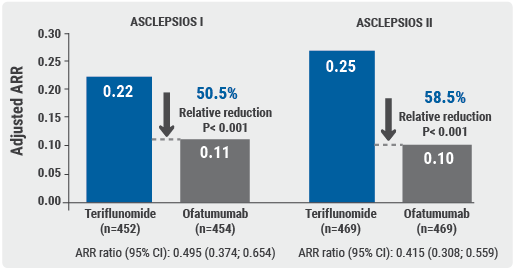Thalamic atrophy occurs early and consistently over the course of MS, at a rate that is faster than in healthy controls. MS has both a direct effect on the thalamus by neuronal loss, and an indirect effect due to axonal transection in lesions which affects afferent and efferent projections of the thalamus. Thalamic atrophy may therefore be a useful marker of therapeutic effects. This study assessed the efficacy of switching to or maintaining ocrelizumab therapy on thalamic atrophy in patients with relapsing and primary progressive MS participating in OPERA I/II and ORATORIO, and evaluated if baseline thalamic volume predicts disability progression during the double-blind period of both trials.
The OPERA I/II trials compared ocrelizumab (n=827) to interferon β-1a (n=829) in relapsing MS patients; ORATORIO compared ocrelizumab (n=488) to placebo (n=244) in primary progressive MS patients.
Ocrelizumab significantly reduced thalamic atrophy in patients who were initially randomised to ocrelizumab compared with those initiating ocrelizumab later (all P<0.001; see Table). The correlation of thalamic volume with CDP as measured by 9HPT, EDSS, and timed 25-feet walk was significant in both trials, albeit modest.
Table: Percentage change in thalamic volume from baseline in OLE of OPERA I/II and ORATORIO trials [1]

IFN β-1a, interferon β-1a; OCR, ocrelizumab; PBO, placebo; OLE, open-label extension.
- Arnold D, et al. Reduced thalamic atrophy in patients initiating earlier versus delayed ocrelizumab therapy: results from the OLE of OPERA I/II and ORATORIO. MSVirtual 2020, Abstract FC03.05.
Posted on
Previous Article
« No new safety signals in ofatumumab open-label data Next Article
Update on estimated PML risk related to fingolimod »
« No new safety signals in ofatumumab open-label data Next Article
Update on estimated PML risk related to fingolimod »
Table of Contents: MS Virtual 2020
Featured articles
Online First
Positive results for vagus nerve stimulation in RA
COVID-19 and MS
Biomarkers
Treatment Strategies and Results
Management of progressive MS with approved DMT
Novel Treatment Directions
Positive results for vagus nerve stimulation in RA
Neuromyelitis Optica Spectrum Disorders
Miscellaneous Topics
Related Articles
August 27, 2019
Promising results of novel NMOSD treatments

April 29, 2021
Does fampridine improve upper limb function in MS?

November 8, 2019
Late-breaking: Ofatumumab versus teriflunomide in relapsing MS
© 2024 Medicom Medical Publishers. All rights reserved. Terms and Conditions | Privacy Policy
HEAD OFFICE
Laarderhoogtweg 25
1101 EB Amsterdam
The Netherlands
T: +31 85 4012 560
E: publishers@medicom-publishers.com

